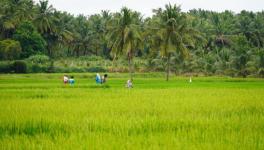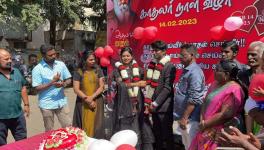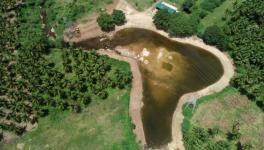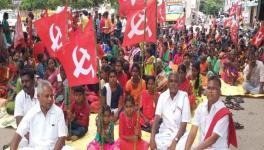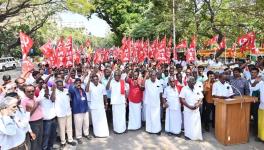Slums, Poor Localities Struggle to Resume Normal Life in Michaung-hit Tamil Nadu
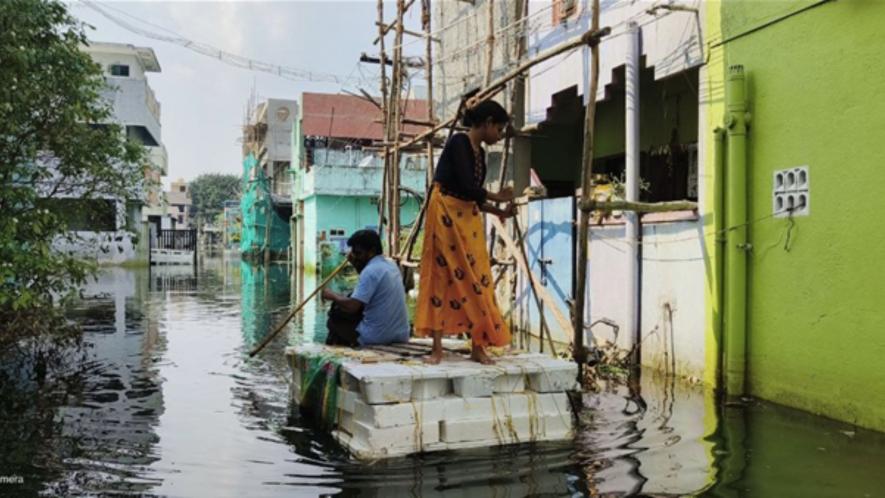
A makeshift boat in Yamuna Nagar, in Tamil Nadu’s Tiruvallur district. Image courtesy: Arappor Iyakkam.
A week has passed since floods were triggered by Cyclone Michaung, yet specific localities in Chennai and its neighbouring districts are struggling to return to normalcy. Most people living in apartments and middle-class localities returned to work a day or two after the floods. But slumdwellers and those living in slum resettlement colonies are worst affected.
Youth organisations, civil society groups, fan clubs and political parties mobilised funds to provide ration in some of the affected localities. They provided dry ration, clean water, medical supplies and toiletries. However, these are not enough for the poor affected by the floods to resume work as most of their belongings were drenched.
The Greater Chennai Corporation (GCC) drained out rainwater using suction lorries in places where houses were inundated. Garbage was removed from water channels and water bodies to clear out clogging andensure smooth flow of water. Sanitation workers were deployed from other districts to remove garbage on the streets.
Yet there are complains that these measures were restricted to the middle-class and upper-middle class localities with the urban poor still struggling to recover from the floods.
Michaung reached peak intensity on December 4 as it approached the Tamil Nadu coast and moved northwards along the coast making a landfall after Nellore, in Andhra Pradesh, next day. By December 6, the rains had receded and the sun was out, but it was a disaster for many families.
DELAY IN GOVTERNMENT RELIEF
As soon as the rains receded, SOS messages flooded social media platforms with calls for relief. Urgent calls for dry ration in slum settlements, cooked food and clean water were forwarded On these platforms and groups.
Tamil Nadu Science Forum, South Chennai, mobilised funds to provide relief material worth Rs 500 each for 1,500 families in Velachery, Sholinganallur, Pallikaranai and Tambaran. The kits included food items, clean water, hygiene products and basic medical supplies.
“Some of the worst affected areas were contacted by the government machinery only two days after the rains receded. People was suffering and surviving in inundated houses till then,” said health activist Suresh Dandapani.
Writer and social activist Shalin Maria Lawrence took to her X handle to post: “It’s been a week since Chennai was devastated by a really big cyclone.The flood situation was worse across the city but the North Madras inhabitants, predominately poor Dalits, were affected big time.”
She added: “Now, people are still stranded, certain places still water logged. And no proper help has been given except for individual volunteers.”
In Yamuna Nagar, Nazarathpet and Poondhamalli, in Tiruvallur district, where 250 families reside, waist-deep stagnant water is still on the road, Arappor Iyakkam posted on its X.“Instead of asking the residents how water can stand on your road under our regime, we urge to help remove the stagnant water.”
“This time the government targeted and provided assistance to the differently-abled community and transgender people. Dry ration worth Rs 25 lakh was distributed, which should last up to a week. That is good,” said Dandapani.
SLUMS, RESETTLEMENTS WORST AFFECTED
Bharanidharan, an activist of the Democratic Youth Federation of India, said, “We have been doing relief work in Kannagi Nagar, Perumbakkam, Kallukuttai and Chemmenchery for more than a week. The slum settlements and slumresettlement colonies are the worst affected along the OMR. Although flood water has receded, they have still not resumed normal life.”
Old Mahabalipuram Road, south Chennai, or the IT expressway, houses resettlement colonies of slums from Chennai city.
“We provided dry ration, like one to two kgs of rice and dal to each family.It would last them for a few days. But only after they receive the government provided flood-assistance, they can recover. Although the money is not sufficient, it would help restart life. They have lost their bare essentials, furniture and electronics like mixer, grinder and TV,”Bharanidharan said.
The state government announced Rs 6,000 assistance for every family with a rationcard.
“The participation of youth in relief work and the contribution of corporate entities was limited this time. After the floods in 2015, a larger machinery was on ground doing the relief work and more funds were pumped in for recovery,” saidDandapani.
“The 2015 floods were more disastrous.Within a few hours, a large amount of rainwater poured into parts of the city. Cyclone Michaung brought 24 hours of continuous rain, but the quantity of water was spread out,” he added.
“Maybe because the state government and GCC confidently said that the storm work drain carried out in the last two years can handle any amount of rain, corporate entities and NGOs have not provided much funds. Clearly, the state government was proved wrong,” he added.
SANITATION WORK ON WARFOOTING
Sanitation workers were deployed from other districts, like Coimbatore, to do post-flood sanitation work in Chennai.
Dandapani, who met the workers in Zone 14 of Chennai, said “Their contribution was immense.They removed tonnes of garbage in the city within a few days. They were provided biryani for lunch on Tuesday and given a respectable send-off.They have to resume work in their respective districts.”
Even construction workers, especially women, were hired through private firmsfor Rs 600 per day for sanitation work. “They had lost their livelihood over the past week. So, they took up sanitation work. Unfortunately, they had to do sanitation work. They will continue the work and remove the remaining garbage,” he added.
“The sanitation work has immensely contributed to contain the spread of diseases. The zonal health officer also said that there has been no specific outbreak of any disease following the flood. No vector-borne diseases were identified in the health camps, which are working round the clock. Only a week later, we would know if the floods caused any health hazard,” he said.
Get the latest reports & analysis with people's perspective on Protests, movements & deep analytical videos, discussions of the current affairs in your Telegram app. Subscribe to NewsClick's Telegram channel & get Real-Time updates on stories, as they get published on our website.










